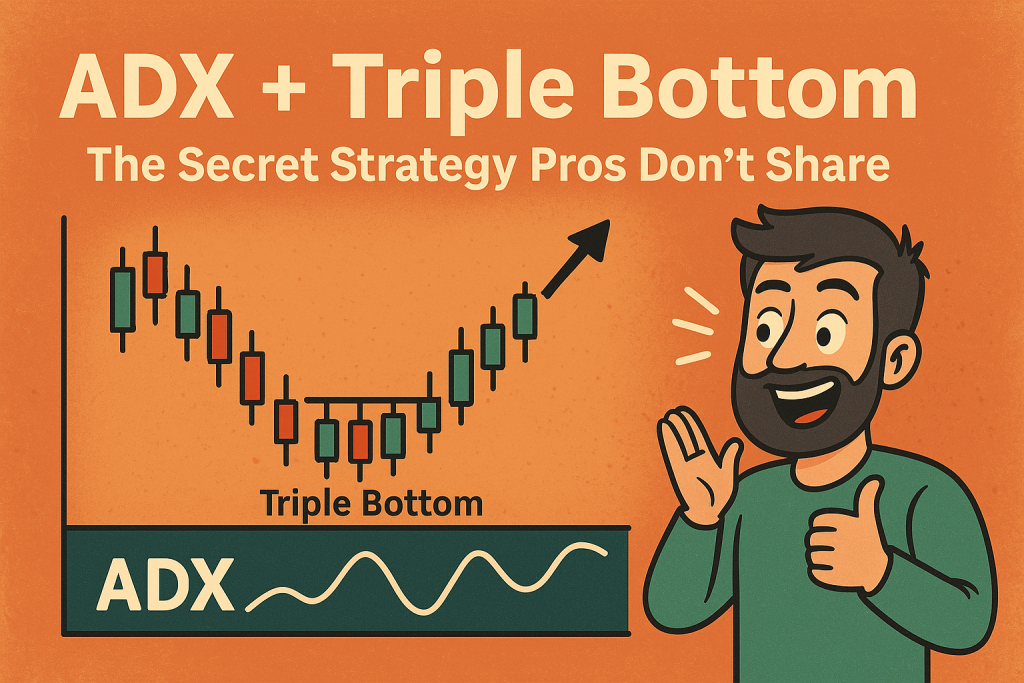The ADX + Triple Bottom Combo That Wall Street Doesn’t Want You to Use

Picture this: You’re analyzing a chart, sipping lukewarm coffee, wondering if this “triple bottom” you’re seeing is legit or just another market prank. Enter the ADX (Average Directional Index), the trader’s lie detector test. Combine that with the triple bottom formation and you get a market move so powerful, even institutional traders start sweating through their thousand-dollar suits.
Let me break it down with style, stats, and secrets most traders never even think to look for.
The Setup That Outsmarts the Smart Money
Let’s start with the basics—but with a twist. The triple bottom is like the market’s way of saying: “Hey, I’m tired of falling, let’s go up for a change.” It’s a reversal pattern, usually signaling the end of a downtrend. But here’s the problem: most traders jump in too early. They see the third bottom forming and treat it like a trampoline. Reality? It’s often more like quicksand—unless the ADX confirms the trend strength.
Here’s how to know it’s not a fakeout:
- Step 1: Spot the Triple Bottom
- Look for three clear lows at approximately the same price level.
- Volume should decrease on the first two bottoms and spike on the breakout above the neckline.
- Step 2: Call in the ADX
- Add the ADX indicator to your chart. If it’s below 20 during the formation of the triple bottom, it’s telling you the market has no trend—which is exactly what you want before a reversal.
- As the price starts to break above the neckline, ADX should be rising above 25. This is your green light. It means the new trend has legs.
Why Most Traders Miss This Move
Because they treat the ADX like background noise. But in this setup, the ADX is your spotlight. According to J. Welles Wilder, the creator of the ADX, readings below 20 indicate a weak trend (or no trend), while readings above 25 show the birth of a new trend. The triple bottom’s entire job is to transition from weakness to strength.
Insider Tip: Don’t just rely on price action. Confirm the reversal with volume and ADX rising. Think of ADX as the hype man that shows up after the breakout—if he doesn’t show, the crowd isn’t dancing.
The Forgotten Playbook: ADX During the Triple Bottom Formation
Most traders obsess over when to enter. Pros obsess over when not to enter. And here’s where things get juicy.
Game-Changing Entry Strategy:
- Avoid entering during the third bottom. It’s still within the pattern. Patience, my friend.
- Wait for the breakout above resistance (neckline).
- Check the ADX:
- If ADX is rising and above 25 = Trend Confirmation = Entry signal.
- If ADX is still below 20 = Stay out. Market’s not ready.
Use This Rare Filter for Ninja Precision:
Pair ADX with DI+ and DI-. When the DI+ crosses above DI- after the breakout, it’s like the market just handed you a VIP invitation to the trend party.
Case Study: EUR/USD, November 2023
- Triple bottom formed near 1.0500.
- ADX was under 15 during the formation.
- Breakout happened mid-November.
- ADX climbed from 17 to 27 within 48 hours.
- DI+ crossed above DI- right after breakout.
- Result: EUR/USD rallied 180 pips in 3 days.
Why This Works When Other Strategies Fail
Because it adapts to market psychology. The triple bottom reflects accumulation—smart money quietly buying. The ADX confirms when the smart money goes public.
What You Should NEVER Do:
- Never treat a triple bottom as valid if volume is flat.
- Never enter on the third bottom unless you’re bored and just want to donate money to the market.
- Never rely on ADX alone. It’s a strength indicator, not a direction indicator.
But here’s where the real magic happens:
The ADX is trend-agnostic. It doesn’t care if price is going up or down; it cares how strong that move is. So when the triple bottom signals reversal and the ADX says, “Yup, this move’s got muscle,” you’re not just trading hope. You’re trading momentum-backed conviction.
The One Simple Trick Pros Use With ADX + Triple Bottom
They stack confluence like Tetris pros. Here’s how:
- Triple Bottom confirms psychological support.
- Volume Spike on breakout = Confirmation that someone big cares.
- ADX rising above 25 = Trend strength.
- DI+ > DI- = Directional confirmation.
- Retest of neckline = Ideal entry for sniper traders.
This is the “Golden Confluence” that pros use when they want to hit precision entries.
The Secret Sauce: ADX Divergence Before Breakout
Here’s a little-known secret that even veteran traders miss:
When ADX shows a higher low while price forms the third bottom, it can signal underlying trend strength building beneath the surface.
Translation: The smart money is quietly setting up shop.
Elite Tactic:
- Draw a trendline on the ADX indicator.
- If you see a bullish divergence (higher lows on ADX while price forms flat or lower lows), get ready. The breakout is likely to explode.
Insider Wisdom From the Legends
“The market is designed to fool most of the people, most of the time.” — Jesse Livermore
“ADX doesn’t predict direction; it measures commitment. Use it wisely, and you won’t just follow trends—you’ll lead them.” — Linda Raschke
Final Thoughts: Timing Isn’t Everything—It’s the Only Thing
The ADX + triple bottom combo is not about jumping the gun. It’s about waiting for confirmation with monk-like patience and then striking with ninja-like precision. It’s not flashy. It’s not trending on Reddit. But it works. And sometimes, that’s the real edge.
If you want to sharpen your edge even further:
- Stay updated with cutting-edge Forex insights at StarseedFX Forex News
- Download your Free Trading Journal to track and refine setups like this
- Join our Community for elite signals and live chart breakdowns
And remember: don’t let your trading strategy be as unreliable as that one friend who always “forgets” their wallet.
—————–
Image Credits: Cover image at the top is AI-generated
PLEASE NOTE: This is not trading advice. It is educational content. Markets are influenced by numerous factors, and their reactions can vary each time.

Anne Durrell & Mo
About the Author
Anne Durrell (aka Anne Abouzeid), a former teacher, has a unique talent for transforming complex Forex concepts into something easy, accessible, and even fun. With a blend of humor and in-depth market insight, Anne makes learning about Forex both enlightening and entertaining. She began her trading journey alongside her husband, Mohamed Abouzeid, and they have now been trading full-time for over 12 years.
Anne loves writing and sharing her expertise. For those new to trading, she provides a variety of free forex courses on StarseedFX. If you enjoy the content and want to support her work, consider joining The StarseedFX Community, where you will get daily market insights and trading alerts.
Share This Articles
Recent Articles
The GBP/NZD Magic Trick: How Genetic Algorithms Can Transform Your Forex Strategy
The British Pound-New Zealand Dollar: Genetic Algorithms and the Hidden Forces Shaping Currency Pairs
Chande Momentum Oscillator Hack for AUD/JPY
The Forgotten Momentum Trick That’s Quietly Dominating AUD/JPY Why Most Traders Miss the Signal
Bearish Market Hack HFT Firms Hope You’ll Never Learn
The One Bearish Market Hack High Frequency Traders Don't Want You to Know The

